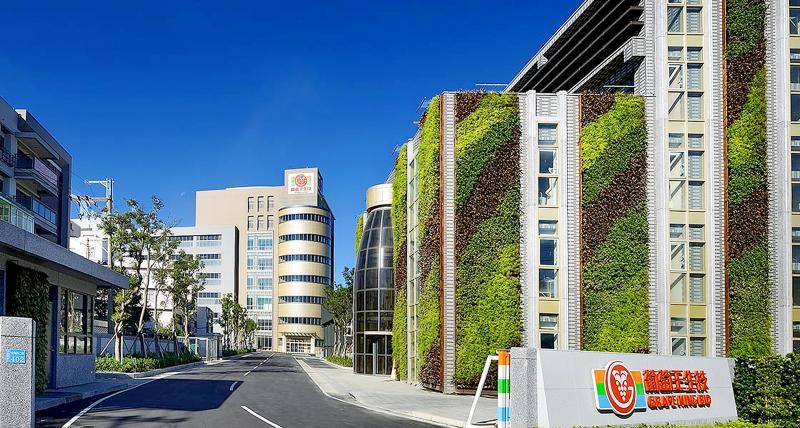Grape King Bio Ltd (葡萄王), a supplier of probiotics and health foods, on Tuesday reported sales of NT$793 million (US$28.18 million) for last month, up 5.94 percent from August and 6.06 percent from a year earlier.
The firm attributed the growth to contributions from its contract manufacturing business and new product launches, including Kombucha, a fermented tea, and another beverages containing probiotics.
Domestic demand for health foods has also recovered due to a decrease in local COVID-19 infections, it added.

Photo courtesy of Grape King Bio Ltd
Sales for last quarter fell 4.01 percent from the previous quarter, but increased 10.87 percent year-on-year to NT$2.4 billion, with cumulative sales in the first nine months rising 7.07 percent annually to NT$6.87 billion, it said.
Its China-based unit, Shanghai Grape King Enterprises Corp (上海葡萄王), reported a 16.43 percent annual increase in revenue for last month, and sales are expected to grow year-on-year again this month if the effect of China’s power rationing is limited, the firm said.
Separately, Dr Wu Skincare Co Ltd (達爾膚生醫科技) reported sales of NT$117 million for last month, up 54.7 percent from a year earlier, with its third-quarter sales totaling NT$330 million, up 44 percent year-on-year.
Dr Wu credited the growth to a recovery in sales at its physical channels in Taiwan and a double-digit increase in sales on its online platforms, saying that sales in China also expanded, as orders from distributors increased ahead of the Double 11 shopping event.
For the first nine months, cumulative revenue grew 45 percent year-on-year to NT$804 million, Dr Wu said, adding that it is upbeat regarding the fourth quarter, as it is usually a peak season for the beauty industry.

Taiwan Semiconductor Manufacturing Co (TSMC, 台積電) would not produce its most advanced technologies in the US next year, Minister of Economic Affairs J.W. Kuo (郭智輝) said yesterday. Kuo made the comment during an appearance at the legislature, hours after the chipmaker announced that it would invest an additional US$100 billion to expand its manufacturing operations in the US. Asked by Taiwan People’s Party Legislator-at-large Chang Chi-kai (張啟楷) if TSMC would allow its most advanced technologies, the yet-to-be-released 2-nanometer and 1.6-nanometer processes, to go to the US in the near term, Kuo denied it. TSMC recently opened its first US factory, which produces 4-nanometer

PROTECTION: The investigation, which takes aim at exporters such as Canada, Germany and Brazil, came days after Trump unveiled tariff hikes on steel and aluminum products US President Donald Trump on Saturday ordered a probe into potential tariffs on lumber imports — a move threatening to stoke trade tensions — while also pushing for a domestic supply boost. Trump signed an executive order instructing US Secretary of Commerce Howard Lutnick to begin an investigation “to determine the effects on the national security of imports of timber, lumber and their derivative products.” The study might result in new tariffs being imposed, which would pile on top of existing levies. The investigation takes aim at exporters like Canada, Germany and Brazil, with White House officials earlier accusing these economies of

Teleperformance SE, the largest call-center operator in the world, is rolling out an artificial intelligence (AI) system that softens English-speaking Indian workers’ accents in real time in a move the company claims would make them more understandable. The technology, called accent translation, coupled with background noise cancelation, is being deployed in call centers in India, where workers provide customer support to some of Teleperformance’s international clients. The company provides outsourced customer support and content moderation to global companies including Apple Inc, ByteDance Ltd’s (字節跳動) TikTok and Samsung Electronics Co Ltd. “When you have an Indian agent on the line, sometimes it’s hard

PROBE CONTINUES: Those accused falsely represented that the chips would not be transferred to a person other than the authorized end users, court papers said Singapore charged three men with fraud in a case local media have linked to the movement of Nvidia’s advanced chips from the city-state to Chinese artificial intelligence (AI) firm DeepSeek (深度求索). The US is investigating if DeepSeek, the Chinese company whose AI model’s performance rocked the tech world in January, has been using US chips that are not allowed to be shipped to China, Reuters reported earlier. The Singapore case is part of a broader police investigation of 22 individuals and companies suspected of false representation, amid concerns that organized AI chip smuggling to China has been tracked out of nations such